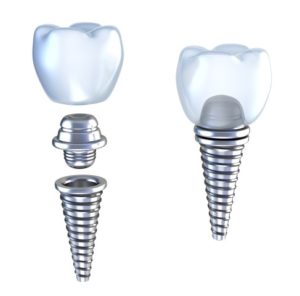06 Feb Why can’t children get dental implants?
 Dental implants are designed for addressing tooth loss among adults, not children. There are quite a few reasons why dental implants are unsuitable for children. Children and some teenagers’ bodies are still developing oral tissue. For example, the jaws continue to grow and develop well into a person’s teenage years. Moreover, children have a second set of teeth. After deciduous (baby) teeth fall out, permanent adult teeth emerge. While some children might be missing teeth for congenital reasons, it is still unwise to pursue dental implants because oral structures are still developing. While implants are not suitable for kids, they do make excellent replacement teeth for adults.
Dental implants are designed for addressing tooth loss among adults, not children. There are quite a few reasons why dental implants are unsuitable for children. Children and some teenagers’ bodies are still developing oral tissue. For example, the jaws continue to grow and develop well into a person’s teenage years. Moreover, children have a second set of teeth. After deciduous (baby) teeth fall out, permanent adult teeth emerge. While some children might be missing teeth for congenital reasons, it is still unwise to pursue dental implants because oral structures are still developing. While implants are not suitable for kids, they do make excellent replacement teeth for adults.
What does a dental implant look like?
A dental implant looks a little bit like a screw. This is because an implant features ridges so that it is stable once bone fuses to it. Implants are small cylinder-shaped components made from titanium. They have a tapered end and a wider end, which features an abutment for securing restorations and prosthetics.
How do dental implants address tooth loss?
Dental implants address tooth loss differently than conventional prosthetics. The dental implant itself is a replacement for the missing roots of teeth. It is embedded into the jawbone so that bone in the jaw can fuse around the implant over time. Once the implant becomes stabilized by bone, it will then support a person’s permanent restoration or prosthetic.
When it comes to using one dental implant, the most common restorations and prosthetics attached are crowns and bridges. Multiple dental implants can be embedded to support more extensive prosthetics like full and partial dentures.
Are there benefits to choosing implants?
There are unique advantages to choosing dental implants over more traditional tooth replacement methods. Dental implants become one with the body, which means that implants can have incredibly long lifespans. Since bone anchors the implant and the implant anchors the restoration/prosthetic, patients can enjoy eating a variety of foods, including tougher to eat items. Another benefit to choosing dental implants is the fact that implants support bone health by keeping bone stimulated. Unstimulated bone can be resorbed by the body – a common side effect of tooth loss.
For more information about dental implants, call the office of Dr. Philip Kozlow at 972-458-2464 and schedule a consultation today.
